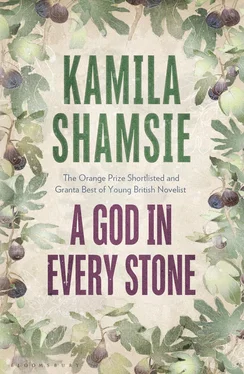The next morning came a note from the naik at Kitchener to say Kalam would soon recover, and in the meantime he had been transferred to Barton-on-Sea. And that afternoon Qayyum’s eye arrived from the glass maker’s and the doctor said he could return to India.
On the last day in Brighton, Qayyum stood for a very long time near the doorway of Ward 3. Along the length of the walls were paintings of slim-trunked trees. A caged bird and an uncaged bird looked at each other, their gazes undeflected by the black and white butterflies flitting between them. The caged bird was the same muted orange as the door to its prison; the uncaged bird was the brown of the branch on which it stood, the tips of its wings the green and red of surrounding leaves and flowers. Qayyum took a step back — the birds, the flowers, the butterflies, and the tree itself were enclosed in a gold frame, its shape that of a cage.
It wasn’t until he was on the hospital ship, on his way back to India, that Qayyum realised the reason he hadn’t received any response to the letters sent to Barton-on-Sea was that the message from the naik was a lie. He rushed out onto the deck, prepared to leap into the cold waters of the Atlantic, but it was too late, Britain was just a pinprick — such a small, small island.
City of Men, City of Flowers
At last, the two-rivered river.
Brightness scythed through the air into Viv’s eyes as the train trundled out of the fortified entrance to the bridge; a dark imprint of river, hills, fort behind squeezed eyelids. What the negative couldn’t reveal was this: two rivers running parallel to each other in one body of water — the blue of melted snow running down from the Himalayas, the brown of silt and turbulence racing across from Kabul. Progressing side by side until they passed beneath the Campbellpur Fort and merged.
Here, two and a half thousand years ago, Scylax sailed in on the muddied arm of the Cophen River and dived — how could anyone imagine he would do otherwise? — right into the jewelled blue.
Viv reached for her calfskin notebook even as the train crossed into the Peshawar Valley, splaying it open against the window, quickly sketching before memory could commence too far with its tampering. Had the light reflected differently off the two rivers in one? Did she really see a dolphin leap repeatedly in and out of the water along the border of the rivers, as though it were a needle stitching them together? She must keep as accurate a record as possible for Tahsin Bey.
She wrote Indus along the north-south length of the blue river, Kabul/Cophen beside the east-west muddy river, before turning the pages to find the lines she had copied out from Arrian’s Anabis Alexandri: The Indus emerges, already immense, from its sources, and after receiving the water of fifteen rivers, all of them larger than the rivers of Asia, and imposing its name upon them, empties into the sea . Arrian, citizen of the Roman Empire, writing about Alexander’s empire, his phrase still echoing in Britannia’s empire: imposing its name upon them. Wasn’t that what the British were doing when they glued the names of empire-builders onto Indian suffixes, resulting in Campbellpurs and Abbottabads and Forbesganjes. What she wanted was not to impose names onto the ancient places but to peel them away, back and further back, to locate the Cophen beneath Kabul, the Peukelaotis beneath Charsadda, the Caspatyrus — most of all the Caspatyrus — beneath Peshawar.
— Caspatyrus!
The syllables detonated in the silence of the second-class compartment, and Qayyum Gul’s hand jerked up to cover his left eye. He must have done something to indicate pain because the Englishwoman who had expelled the strange sound — was it a name, a sneeze, a foreign language? — glanced in his direction, if not quite at him, before resuming her vigil at the window.
He had no idea why she was here; an hour or so earlier she had entered the compartment while Qayyum was stretched out, half-asleep, and had deposited herself and her large bag onto the row of seats opposite him with the words, This berth is free, isn’t it? He had sat up quickly and watched the door for a few moments, expecting a husband to walk in or perhaps a father, but it quickly became obvious that he was alone in a train carriage with a young Englishwoman whose physical appearance was a cluster of contradictions: the blue eyes beneath long lashes were entirely feminine, but the hair was cut short like a boy; the sun-darkened skin suggested she worked in the fields, but everything about her manner indicated affluence. The skirt, halfway up her calves, might have meant she had the cast-off wardrobe of a shorter woman, but there was something in her brazen confidence which convinced him she was choosing to make men look at her ankles. Of course he had left, seeking out the conductor who said the only available place was in the compartment with two English ladies which was where the other English lady should be seated. With Qayyum standing outside in the corridor the conductor entered to speak to her, and emerged a few seconds later, shaking his head at Qayyum. The Englishwoman followed him out and smiled brightly at Qayyum. You’ll make me feel terrible if you skulk outside; you must come in, she said. As if it were that simple. But he had gone in, remembered anger from Brighton guiding his steps; let them object, any of the able-bodied Englishmen in the other compartments — he would stand up tall and say, Lance-Naik Qayyum Gul, 40th Pathans. But the compartment was at the end of the train, and no one had walked past.
He looked over to the Englishwoman who had paid him no attention since he re-entered the compartment — whether through propriety or indifference, he couldn’t tell. What did she see, or hope to see, outside the window which allowed her to meet the sun’s ferocity head-on, impervious to the red patches at her uncovered throat? Qayyum angled his body deeper into the shaded part of the leather-covered seat, which now burnt where the sunlight reached it, knowing the Englishwoman must be entirely aware of his discomfort.
A man in a starched white uniform entered the compartment, carrying a dripping wet khus blind in each hand, a stool under his arm. The Englishwoman moved away from the window, saying Jaldi, jaldi — one of the first things any Englishman or woman learned in India was how to tell the Natives to hurry up — and the uniformed man apologised even as he stood on the stool, untied the dried khus blinds and replaced them with the wet ones. As soon as the first one was up, the fan positioned behind it blew cool, fragrant air through the compartment and Qayyum heard himself exhale loudly. The world turned beneficent.
The Englishwoman made an impatient rotating motion with her finger and the uniformed man rolled one of the blinds up and secured it with string so that a large square of glass was again visible, heat ballooning towards it from the plains. Immediately the Englishwoman smiled, thanking the uniformed man as though he’d done a favour rather than carried out a command, and handed him a coin — the man touched his hand to his forehead, his body language shifting into obsequiousness. In the Army, hierarchy allowed for pride, insisted on it; the salute of a sepoy to a general was always straight-backed.
The Englishwoman reached into her bag, pulled out a bread roll and broke it in two. The faint scent of it an echo carried across the sea. Fresh loaves of bread at the station stop in Marseilles on the way to the Front.
— You’re a Pathan?
The Englishwoman was standing in the space between the two rows of seats, holding out half the bread roll. Her hand freckled like the shoulder of the French girl. Qayyum shook his head, far more vigorously than was needed to indicate a lack of appetite. She gave him a look before she sat down, one which said, Are you in any position to refuse a kindness? He put a hand up to his face.
Читать дальше












